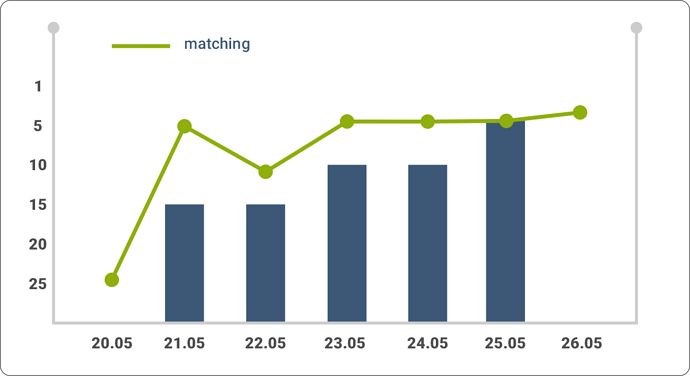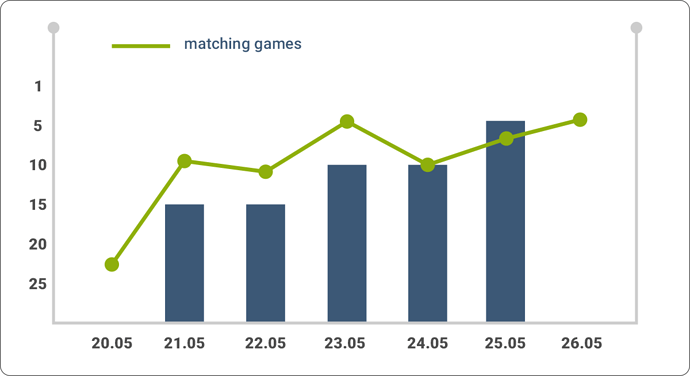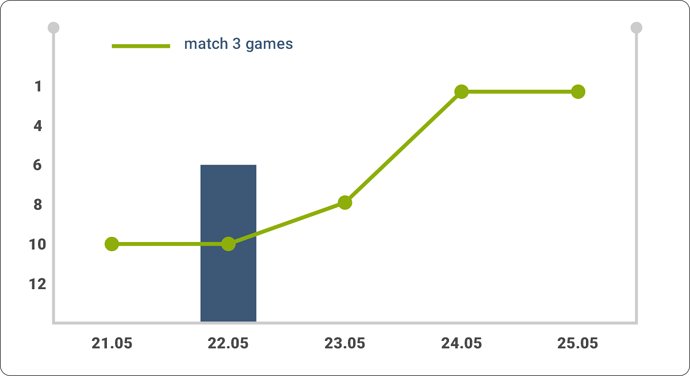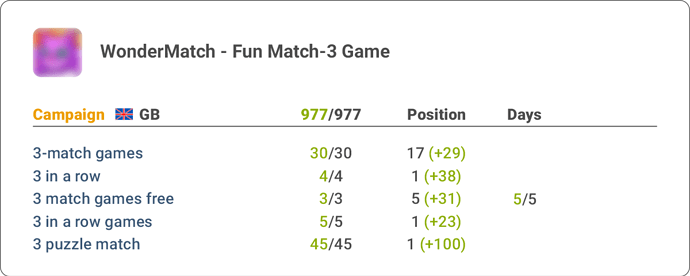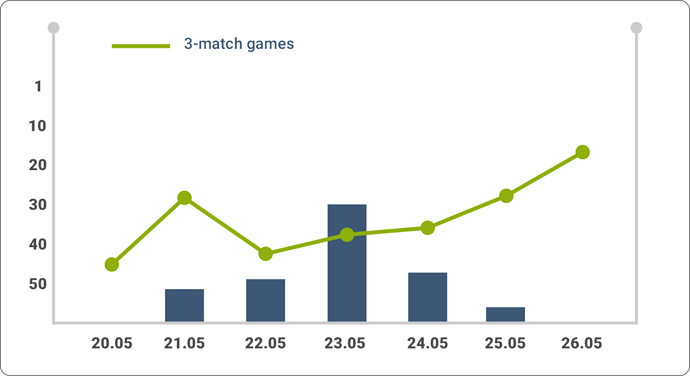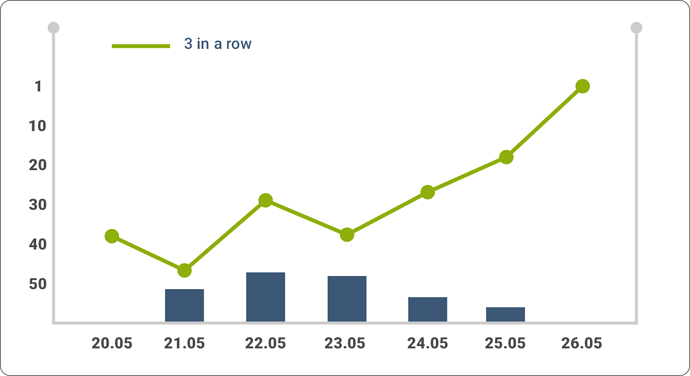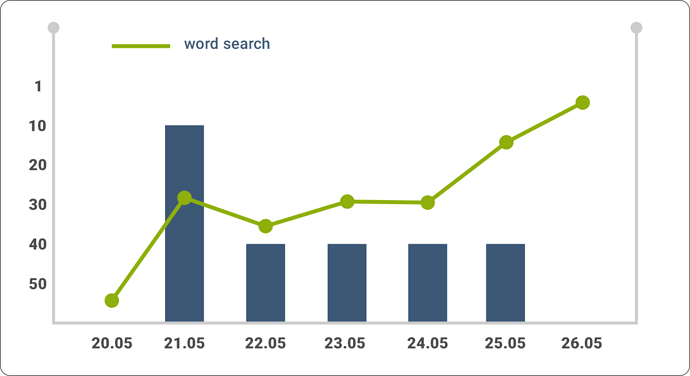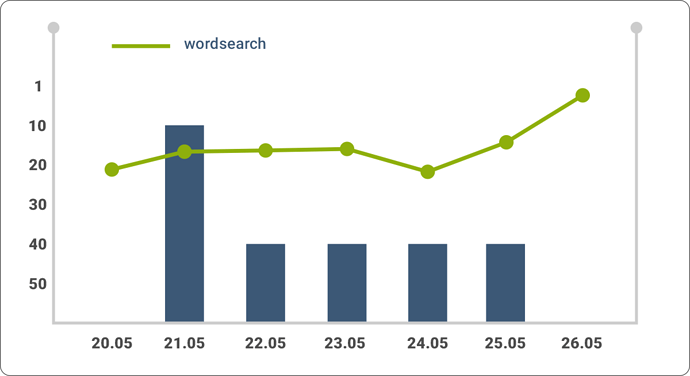Game app promotion cases and marketing strategy for both Stores. Features and secrets from our support team
Creating games is only half of the iceberg that is visible to the developer. Games are a highly competitive niche, new apps are popping up all the time, and it becomes harder to draw user’s attention to choose your product, especially if the app is not in the TOP of Google Play or Apple Store search results. Today we will tell and show how to get the long-awaited downloads and beat competitors in the search list.
Make ASO today — save money tomorrow
The first thing to start with is ASO optimization. You can read more about this part of app optimization in our article ASO secrets. First of all, try to collect all possible keywords for which your game can be found by ordinary users. There are several ways to do this:
- see what metadata competitors have, what keys they use in texts
- brainstorm with colleagues and write down all the keys they would use to search for your application
Google Play and App Store algorithms pay attention to different fields for indexing. For Google Play, you must add the keyword in full text. You can use the keyword in the title, short description, and long description at the same time. This will give more chances to index the application for this request.
For the AppStore, you can add each word separately to the different fields mentioned earlier within the same locale. For example, you want to be indexed for the keyword “jewel quest classic”. You can add “jewel” in the title, “quest” in the subtitle, and “classic” in the keyword field. Apple’s algorithm will parse these fields and combine all three words into one keyword.
Now you know the basic nuances of app optimization in different stores, and you can safely proceed to the next stage of promotion with the help of keyapp.top marketing and analytic platform.
Why you need to promote the game app by keys
A keyword is a word or phrase that is related to something in a search. When a person searches for something on the App Store or Google Play, they will see search results with the apps most related to the search query they performed. A keyword in this case is a single word or phrase that expresses the same query in different ways. For example, the keyword “puzzle” will be associated with “puzzles for kids”, “block puzzle”.
The algorithm keeps track of the relationship between search queries and applications, which it will show for the keywords associated with the query. When one app gets more clicks and download conversions from that search than any other app, the algorithm considers it more relevant and moves it up in the search, giving it a higher priority. The more keywords that are closely related to your app, the more traffic it will get from search.
Keyword promotion will be a great addition to your marketing strategy. You can buy installs for certain Google Play keywords and your game will download. It will be found by entering the desired phrase in the keyword search in the store. In addition, motivated users will simulate activity in the app and repeat it after a couple of days. This behavior guarantees a higher retention rate and your game rating will increase.
Keyapp.top helps to promote applications by keywords, and today in this article we will share with you our experience in promoting games for different regions. In this article you will see examples of games that are promoted in multiple countries and for different types of keywords, because in our experience, promotion in several regions is more effective and brings better results. Pay close attention to position changes and installs for the specified time frame so you can repeat this marketing strategy for your game as well.
The secrets of promoting “Match 3” game app on the Apple Store and Google Play in the USA
Let’s look at examples and results of keyword promotion campaigns for the game “Match 3”, a popular match-3 puzzle game. The client promoted an Android app in the US using medium to high popularity keywords. On the screen below you can see an example of an advertising campaign in the United States. The application was promoted by two keywords “matching” and “matching games” for 5 days. In total, 460 installs per 2 keywords were used. The application hit the top for both queries.
You can easily and quickly check the rating, popularity and number of search queries for your keywords after adding the application and keywords to your personal account, as in the example below
The following screenshot shows how the daily number of installs is distributed. For Android apps, we advise you to use a strategy with a gradual daily increase in keyword installs, as Google algorithms are believed to respond better to this type of campaign.
The graphs below show the growth of the application by requests during and after the advertising campaign in keyapp.top. The game moved up from position 25 to 3 for the “matching” keyword, and from 23 to 5 for the “matching games” keyword.
Keep in mind that Google Play do not expect immediate increase in positions for Google Play during or at once after the campaign. On average, growth for a keyword is observed within 3-4 days after the end of the campaign.
The promotion strategy on Apple is significantly different from the one used for Google Play. For iOS applications, you do not need to stretch campaigns for 5-7 days, as for Google. It will be enough to order the required number of installations within 1-2 days. In this case, for “Match 3”, the client used 230 installs per day. The starting position of the application for the keyword “match 3 games” in the US was 10, after the launch of the advertising campaign, the game took 2nd position.
The following screenshot shows the application growth graph for the keyword “match 3 games” during and after the advertising campaign. The game has moved up from 10th to 2nd position in the store.
How to promote game app in European region
A similar Android game in the same category, but with a storyline, was promoted in the UK through multiple channels at the same time. The client turned to a personal manager on the platform with a request to help choose a marketing strategy. After reviewing the app, the support person suggested that the client opt for a 5-day strategy, but the daily installs were increased in the early days of the campaign. In total, 977 installs were used to promote 5 keywords.
The next screenshot shows exactly how many installations were purchased daily.
Let’s look at a couple of growth charts during and after an advertising campaign. By the key “3-match games”, the application was in 46th position at the beginning of growth, after we managed to get into the top 20 and achieve 17th position.
Before the start of the promotion, the application was in position 39 for the query “3 in a row”, after the end of the campaign, the client managed to get into the top 1.
The strategy for promoting the iOS game “Word Search” in Britain looks different. This is a puzzle, which is a rectangular table of letters, in which words are searched – vertically, horizontally and diagonally, in forward and reverse order. In the screenshot below, you can see that the client has been promoting the application for 3 days for the queries “word search” and “wordsearch”.
The screenshot below shows how installs were distributed by day during the campaign.
The client and the keyapp.top manager chose a strategy with an equal distribution of installs for each day, since the most important thing for the IOS algorithm is the very fact that the application receives installs for a keyword. During the campaign, we managed to reach the 5th position for the keyword “word search” (starting 54) and the 3rd position for the query “wordsearch” (starting 20). Below are graphs of app growth for these keywords.
How to run marketing test campaign?
There is no universal promotion method suitable for all games, or a specific number of installs required for a game to reach the TOP. The ranking of your keyword depends on many factors. Thus, the best way to evaluate your potential growth is to conduct a small test campaign, taking advantage of the automatic 50% discount on the first order. You will check if your position is changing for specific keywords or if you need more installs to improve it. You may also see that some keywords are too competitive or irrelevant and it’s useless and expensive to target them.
An ideal test campaign should contain 4-5 keywords, with a minimum of 20 installs per keyword. After 2-3 days, check the data in your personal account on the keyapp.top platform and in the developer console. By analyzing this information, you can estimate the number of installs required for each keyword. If 20 installs is enough and the keyword is showing steady growth, keep ordering the same amount. Some keywords may require more downloads. However, do not overdo it, there should be no consequences from the bay of a large number of installations, and not all keys need to use huge volumes.
You should regularly track your progress and adjust your Google Play and App Store search keywords.
Summary
- Gaming applications are a highly competitive niche, do not neglect promotion in stores, otherwise competitors will do it for you for their games)
- Start with ASO optimization, write down all possible keywords, check the correctness of filling in the fields for indexing. Keep in mind that the requirements for Google Play and the App Store are different.
- To get a higher retention rate and improve your game rankings, use installs for specific keywords. In addition, motivated users will simulate activity in the app and repeat it after a couple of days. This behavior guarantees a higher retention rate and your game rank will rise even more.
- Use keywords not only of high, but also of average popularity. For such requests, it is much easier to reach the TOP without spending the entire marketing budget on promotion.
- The best way to find out the required number of installs for a keyword is to run a test campaign for 5-7 days with 4-5 keywords. Such a test will give you answers not only on the volumes required for each key to increase the app’s ranking, but also tell you which keywords should be promoted further. And a 50% discount on your first order at keyapp.top will help you save your marketing budget.
- For Android apps, we advise you to use a strategy with a gradual daily increase in keyword installs, as Google algorithms are believed to respond better to this type of campaign. The result will be visible in 3-4 days
- For iOS applications, you do not need to stretch campaigns for 5-7 days, as for Google. The result will be noticeable in 1-2 days
If you have any questions, feel free to contact keyapp.top support. A support manager will give you a free personal consultation and prepare a marketing strategy specifically for your game.





